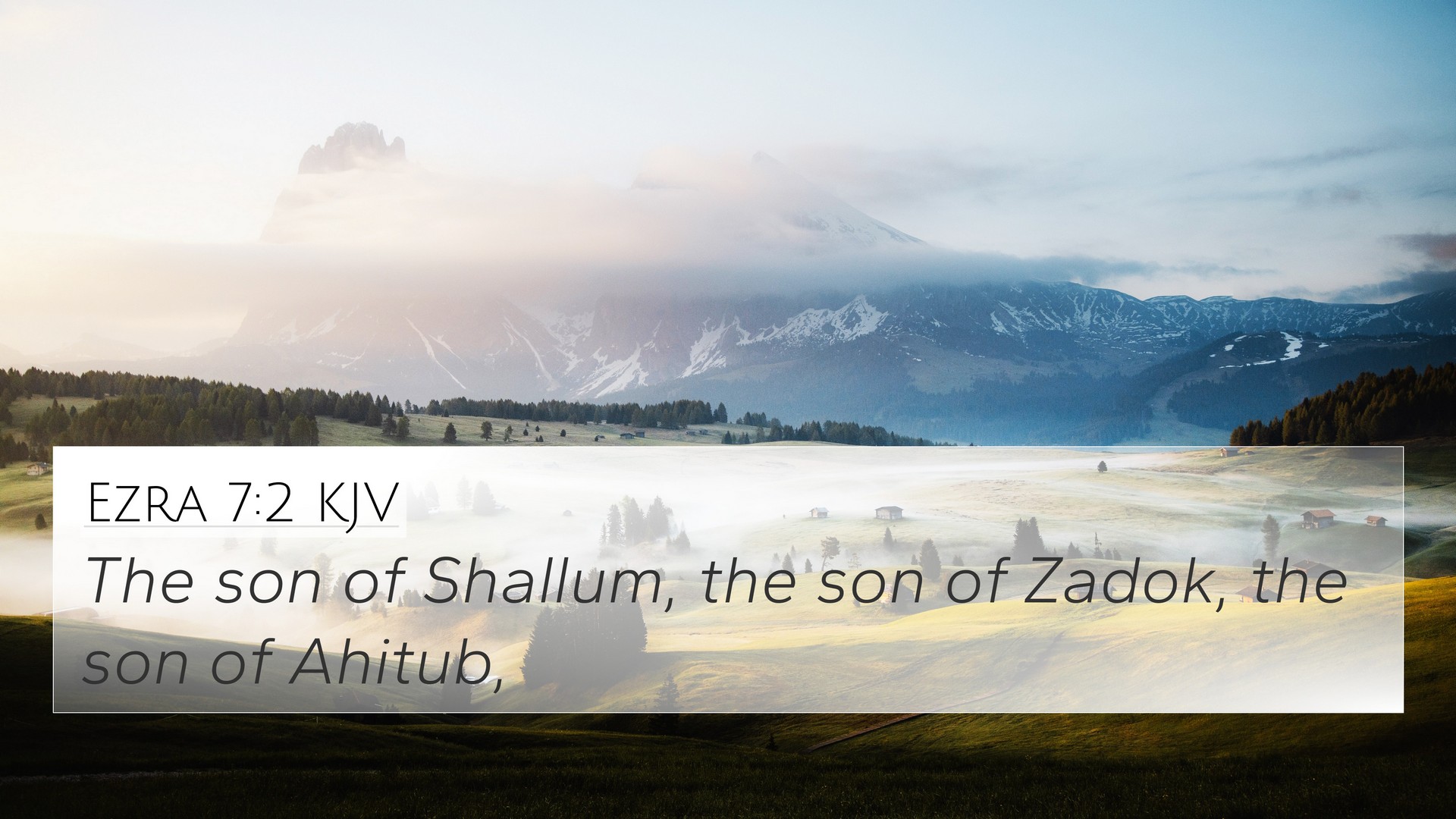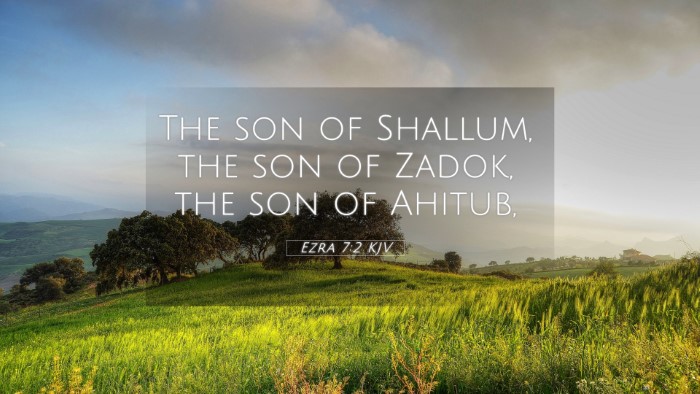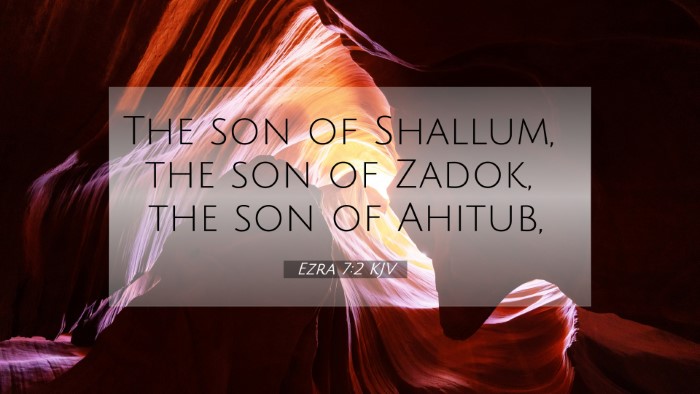Old Testament
Genesis Exodus Leviticus Numbers Deuteronomy Joshua Judges Ruth 1 Samuel 2 Samuel 1 Kings 2 Kings 1 Chronicles 2 Chronicles Ezra Nehemiah Esther Job Psalms Proverbs Ecclesiastes Song of Solomon Isaiah Jeremiah Lamentations Ezekiel Daniel Hosea Joel Amos Obadiah Jonah Micah Nahum Habakkuk Zephaniah Haggai Zechariah MalachiEzra 7:2 Similar Verses
Ezra 7:2 Cross References
The son of Shallum, the son of Zadok, the son of Ahitub,
Uncover the Rich Themes and Topics of This Bible Verse
Listed below are the Bible themes associated with Ezra 7:2. We invite you to explore each theme to gain deeper insights into the Scriptures.
Ezra 7:2 Cross Reference Verses
This section features a detailed cross-reference designed to enrich your understanding of the Scriptures. Below, you will find carefully selected verses that echo the themes and teachings related to Ezra 7:2 KJV. Click on any image to explore detailed analyses of related Bible verses and uncover deeper theological insights.
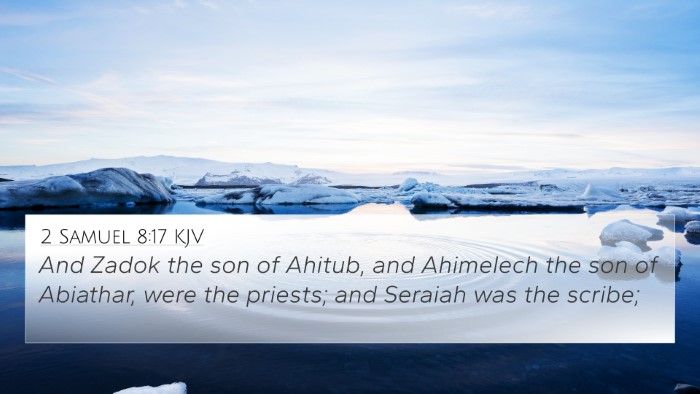
2 Samuel 8:17 (KJV) »
And Zadok the son of Ahitub, and Ahimelech the son of Abiathar, were the priests; and Seraiah was the scribe;
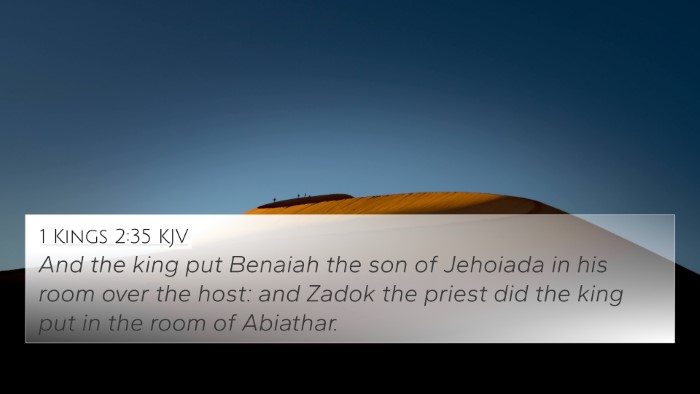
1 Kings 2:35 (KJV) »
And the king put Benaiah the son of Jehoiada in his room over the host: and Zadok the priest did the king put in the room of Abiathar.
Ezra 7:2 Verse Analysis and Similar Verses
Ezra 7:2 (KJV): "Ezra the son of Saraiah, the son of Azariah, the son of Hilkiah."
Summary of Biblical Meaning: Ezra 7:2 presents a genealogical record of Ezra, emphasizing his priestly lineage which is critical in establishing his authority and role in the restoration of the Jewish community after the Babylonian exile. This verse locates Ezra within a significant line of priests, indicating his inherited right to lead the people in religious reforms and the teaching of the Law of God.
Context and Significance
In analyzing Ezra 7:2, public domain commentators highlight the importance of lineage and priestly heritage in ancient Israel. Such genealogical information not only establishes the credibility of Ezra's mission but also connects him to prominent figures in Israel's history.
Key Insights from Commentaries
- Matthew Henry: He notes that Ezra's ancestry is a testament to his qualifications as a priest and a teacher. Henry emphasizes the holistic view of Ezra’s task, indicating that his role is both spiritual and educational as he prepares to lead the returnees from Babylon to restore the worship of Yahweh.
- Albert Barnes: Barnes focuses on the significance of the names listed, each representing a link in the chain that leads to Ezra. This lineage is crucial for validating the priestly role and underscores God’s providential care in calling Ezra for this pivotal mission.
- Adam Clarke: Clarke sheds light on the etymology of these names, exploring the meanings which reflect the qualities and responsibilities associated with the priesthood. He also remarks on how Ezra’s background equips him with both the lineage and the moral authority to guide the people.
Bible Cross-References
Ezra 7:2 draws connections with various passages throughout the Bible. Some relevant cross-references include:
- Nehemiah 8:1-18 - Ezra's reading of the Law and the people's response.
- Malachi 2:7 - Priests are to preserve knowledge and teach the Law.
- Ezra 2:1-2 - The list of those who returned with Zerubbabel and Joshua.
- Jeremiah 29:10-14 - Prophecy concerning the return from exile, which sets the stage for Ezra’s work.
- Psalm 119:11 - Emphasizing the importance of keeping God’s word, reflective of Ezra's role as a teacher.
- John 1:17 - Discusses the law through Moses, drawing parallels to Ezra’s task of renewing the covenant community.
- Ezekiel 44:23-24 - Priests being responsible for teaching Israel about the difference between sacred and secular, akin to Ezra’s mission.
Thematic Connections
The themes surrounding Ezra also establish connections between various Bible verses, showing the broader narrative of restoration and education in spiritual matters:
- Restoration: Both Ezra and Nehemiah play crucial roles in reestablishing worship in Jerusalem after the exile, related to themes found in Isaiah 40:1-2.
- Teaching the Law: Insights from Deuteronomy 31:9-13 highlight the importance of teaching children and the community God’s statutes, a mission embraced by Ezra.
- Authority in Leadership: Cross-references to Titus 1:5 show the necessity of appointing leaders who hold firm to the teachings, paralleling Ezra’s authority as a priest.
Conclusion
Ezra 7:2 encapsulates the importance of genealogy and establishes Ezra’s role as a pivotal figure in the restoration of Israel’s spiritual heritage. Understanding this verse in the broader context of scripture enhances comprehension of God’s unfolding plan for His people, illustrating how the Old and New Testaments are woven together with themes of restoration, education, and leadership. By utilizing tools for Bible cross-referencing, believers can gain a deeper insight into these connections and enrich their study of the Scriptures.
